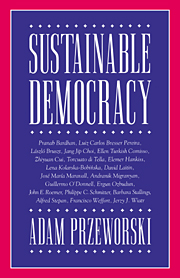Book contents
- Frontmatter
- Contents
- Preface
- Acknowledgments
- Introduction
- PART I DEMOCRACY AND DEMOCRATIC INSTITUTIONS
- 1 Transitions to Democracy and Territorial Integrity
- 2 Democracy, Citizenship, and the State
- 3 Democratic Institutions
- 4 Civil Society
- PART II MARKETS, PROPERTY SYSTEMS, AND ECONOMIC GROWTH
- Conclusion
- Notes
- References
- East-South Systems Transformations Working Papers
- About the Authors
- Author Index
- Subject Index
3 - Democratic Institutions
Published online by Cambridge University Press: 05 May 2010
- Frontmatter
- Contents
- Preface
- Acknowledgments
- Introduction
- PART I DEMOCRACY AND DEMOCRATIC INSTITUTIONS
- 1 Transitions to Democracy and Territorial Integrity
- 2 Democracy, Citizenship, and the State
- 3 Democratic Institutions
- 4 Civil Society
- PART II MARKETS, PROPERTY SYSTEMS, AND ECONOMIC GROWTH
- Conclusion
- Notes
- References
- East-South Systems Transformations Working Papers
- About the Authors
- Author Index
- Subject Index
Summary
Democracies are not all the same. Systems of representation, arrangements for the division and supervision of powers, manners of organization of interests, legal doctrines, and bundles of rights and obligations associated with citizenship differ significantly across regimes that are generally recognized as democratic.
All societies facing the task of constructing democracy face three generic issues: substance versus procedure, agreement versus competition, and majoritarianism versus constitutionalism. Should democratic institutions be expressly organized to facilitate reaching some normative objectives – typically conceptualized a social justice or a commitment to some set of values such as Christianity – or should they be neutral with regard to all values – promoting only liberty and political equality, establishing only procedures, and leaving substantive outcomes to the democratic process? Should democratic institutions be imbued with a moral content or should they be just a system of laws regulating conflicts? Which decisions should be made by agreement and which by competition? Must some institutions, such as constitutional tribunals, the armed forces, or monarchs, stand as arbiters above the competitive process, or should they all be subject to periodic verdicts of elections? Should some decisions, such as the right to private property in the Venezuelan and the Spanish constitutions or the separation between the church and the state, be removed from the competitive realm? Finally, to what extent and by what means should society bind itself to prevent some future transformations?
- Type
- Chapter
- Information
- Sustainable Democracy , pp. 40 - 52Publisher: Cambridge University PressPrint publication year: 1995



